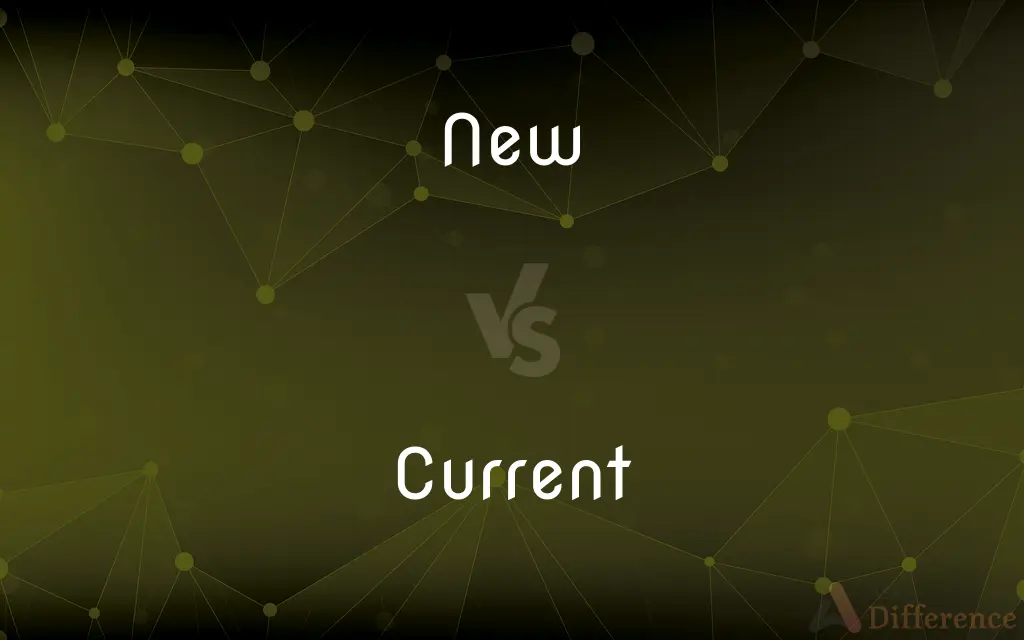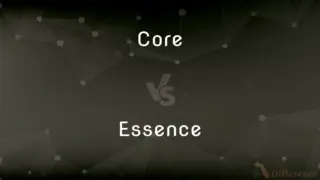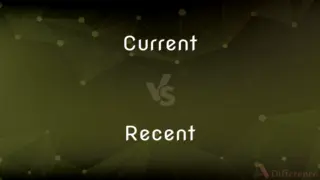New vs. Current — What's the Difference?
By Tayyaba Rehman & Fiza Rafique — Updated on April 29, 2024
"New" refers to something recently created, introduced, or discovered, whereas "current" implies something that is existing now or at the present time.

Difference Between New and Current
Table of Contents
ADVERTISEMENT
Key Differences
The term "new" is used to describe objects, ideas, or situations that have recently come into existence or have been recently acknowledged or adopted. On the other hand, "current" refers to things that are pertinent to the present moment, regardless of when they were first introduced or created. This can include ongoing trends, existing conditions, or prevalent technologies.
"New" often implies a sense of transition from the old to the recently updated or innovated. This could be a new version of a product, a new policy, or a new discovery. Whereas "current" emphasizes the state of being active or in use now, and may not necessarily be recent but is relevant to the ongoing time period.
For example, a "new" gadget means it has been released onto the market recently, offering perhaps innovative features not seen before. In contrast, a "current" gadget might not be the latest release, but is the most recent one still widely used or available in the market.
The usage of "new" can suggest that the subject is replacing or improving upon something else, indicating a departure from what was. Conversely, "current" does not imply improvement or replacement; it simply states that something is existing or happening now.
While "new" carries an implication of being fresh and possibly untested or novel, "current" carries an implication of being established, recognized, and generally accepted as part of the present landscape.
ADVERTISEMENT
Comparison Chart
Time Reference
Recently made or introduced
Existing or happening now
Implication
Innovation, update, fresh start
Ongoing, in use, relevance
Example Usage
New technology, new policy
Current events, current technology
Relation to Change
Indicates a change from the old
Does not imply change, but continuity
Common Contexts
Product releases, ideas, policies
Technologies, trends, situations
Compare with Definitions
New
Recently made, created, or developed.
The company launched a new smartphone model last week.
Current
Pertaining to the present time; ongoing.
The current trend in fashion emphasizes sustainability.
New
Freshly beginning or introduced to a situation or environment.
She moved to a new city for her job.
Current
Maintaining an ongoing relevance or operation.
The current procedures need to be followed until further notice.
New
Not previously existing; introduced for the first time.
The government announced a new policy to address climate change.
Current
Now in progress; happening at this moment.
The current meeting is about the company's sales strategies.
New
Just obtained or engaged with recently.
He read a new book on digital marketing.
Current
Most recent or latest known.
She is reading the current best-selling novel.
New
Being in a first or original state.
They just bought a new car straight from the dealership.
Current
In use or circulation at the moment.
The software they are using is the current industry standard.
New
Produced, introduced, or discovered recently or now for the first time; not existing before
New crop varieties
This tendency is not new
A fascinating mix of the old and the new
The new Madonna album
Current
Belonging to the present time; happening or being used or done now
Keep abreast of current events
I started my current job in 2001
New
Already existing but seen, experienced, or acquired recently or now for the first time
A new sensation
Her new bike
Current
A body of water or air moving in a definite direction, especially through a surrounding body of water or air in which there is less movement
Ocean currents
New
Beginning anew and in a transformed way
Starting a new life
The new South Africa
Current
A flow of electricity which results from the ordered directional movement of electrically charged particles
This completes the circuit so that a current flows to the lamp
Magnetic fields are produced by currents flowing in the cables
New
Newly; recently
New-mown hay
He was enjoying his new-found freedom
Current
The general tendency or course of events or opinion
The student movement formed a distinct current of protest
New
Having been made or come into being only a short time ago; recent
A new law.
Current
Belonging to the present time; present-day
Current events.
Current leaders.
My current address.
New
Still fresh
A new coat of paint.
Current
Being in progress now
Current negotiations.
New
Never used or worn before now
A new car.
A new hat.
Current
Commonly accepted or used; prevalent
Current fashions.
Current technology.
New
Just found, discovered, or learned
New information.
Current
Passing from one to another; circulating, as money or a rumor
Current bills and coins.
New
Not previously experienced or encountered; novel or unfamiliar
Ideas new to her.
Current
Running; flowing.
New
Different from the former or the old
The new morality.
Current
A steady, smooth onward flow or movement
A current of air from a fan.
A current of spoken words.
New
Recently obtained or acquired
New political power.
New money.
Current
The part of a body of liquid or gas that has a continuous onward movement
Rowed out into the river's swift current.
New
Additional; further
New sources of energy.
Current
A general tendency, movement, or course.
New
Recently arrived or established in a place, position, or relationship
New neighbors.
A new president.
Current
A flow of electric charge.
New
Changed for the better; rejuvenated
The nap has made a new person of me.
Current
The amount of electric charge flowing past a specified circuit point per unit time, usually expressed in amperes.
New
Being the later or latest in a sequence
A new edition.
Current
The generally unidirectional movement of a gas or fluid.
New
Currently fashionable
A new dance.
Current
The part of a fluid that moves continuously in a certain direction, especially (oceanography) nocap=a.
New
New In the most recent form, period, or development.
Current
(electricity) the amount of electric charge flowing in each unit of time.
New
Inexperienced or unaccustomed
New at the job.
New to the trials of parenthood.
Current
A tendency or a course of events
New
Of or relating to a new moon.
Current
Existing or occurring at the moment.
Current events
Current leaders
Current negotiations
New
Freshly; recently. Often used in combination
New-mown.
Current
Generally accepted, used, practiced, or prevalent at the moment.
Current affairs
Current bills and coins
Current fashions
New
Recently made, or created.
This is a new scratch on my car!
The band just released a new album.
Current
(India) Electric; of or relating to electricity.
Current bill
Current shock
New
Of recent origin; having taken place recently.
I can't see you for a while; the pain is still too new.
Did you see the new King Lear at the theatre?
Current
(obsolete) Running or moving rapidly.
New
Additional; recently discovered.
We turned up some new evidence from the old files.
Current
Running or moving rapidly.
Like the current fire, that rennethUpon a cord.
To chase a creature that was current thenIn these wild woods, the hart with golden horns.
New
Current or later, as opposed to former.
My new car is much better than my previous one, even though it is older.
We had been in our new house for five years by then.
Current
Now passing, as time; as, the current month.
New
Used to distinguish something established more recently, named after something or some place previously existing.
New Bond Street is an extension of Bond Street.
Current
Passing from person to person, or from hand to hand; circulating through the community; generally received; common; as, a current coin; a current report; current history.
That there was current money in Abraham's time is past doubt.
Your fire-new stamp of honor is scarce current.
His current value, which is less or more as men have occasion for him.
New
In original condition; pristine; not previously worn or used.
Are you going to buy a new car or a second-hand one?
Current
Commonly estimated or acknowledged.
New
Refreshed, reinvigorated, reformed.
That shirt is dirty. Go and put on a new one.
I feel like a new person after a good night's sleep.
After the accident, I saw the world with new eyes.
Current
Fitted for general acceptance or circulation; authentic; passable.
O Buckingham, now do I play the touchTo try if thou be current gold indeed.
New
Newborn.
My sister has a new baby, and our mother is excited to finally have a grandchild.
Current
A flowing or passing; onward motion. Hence: A body of fluid moving continuously in a certain direction; a stream; esp., the swiftest part of it; as, a current of water or of air; that which resembles a stream in motion; as, a current of electricity.
Two such silver currents, when they join,Do glorify the banks that bound them in.
The surface of the ocean is furrowed by currents, whose direction . . . the navigator should know.
New
Strange, unfamiliar or not previously known.
The idea was new to me.
I need to meet new people.
Current
General course; ordinary procedure; progressive and connected movement; as, the current of time, of events, of opinion, etc.
New
Recently arrived or appeared.
Have you met the new guy in town?
He is the new kid at school.
Current
A flow of electricity through a conductor;
The current was measured in amperes
New
Inexperienced or unaccustomed at some task.
Don't worry that you're new at this job; you'll get better with time.
I'm new at this business.
Current
A steady flow (usually from natural causes);
The raft floated downstream on the current
He felt a stream of air
New
(of a period of time) Next; about to begin or recently begun.
We expect to grow at 10% annually in the new decade.
Current
Dominant course (suggestive of running water) of successive events or ideas;
Two streams of development run through American history
Stream of consciousness
The flow of thought
The current of history
New
Newly (especially in composition).
New-born, new-formed, new-found, new-mown
Current
Occurring in or belonging to the present time;
Current events
The current topic
Current negotiations
Current psychoanalytic theories
The ship's current position
New
As new; from scratch.
They are scraping the site clean to build new.
New
Things that are new.
Out with the old, in with the new.
New
A typically light-coloured lager brewed by the bottom-fermentation method.
New
A naval cadet who has just embarked on training.
New
(programming) new up
New
(obsolete) To make new; to recreate; to renew.
New
Having existed, or having been made, but a short time; having originated or occured lately; having recently come into existence, or into one's possession; not early or long in being; of late origin; recent; fresh; modern; - opposed to old, as, a new coat; a new house; a new book; a new fashion.
New
Not before seen or known, although existing before; lately manifested; recently discovered; as, a new metal; a new planet; new scenes.
New
Newly beginning or recurring; starting anew; now commencing; different from what has been; as, a new year; a new course or direction.
New
As if lately begun or made; having the state or quality of original freshness; also, changed for the better; renovated; unworn; untried; unspent; as, rest and travel made him a new man.
Steadfasty purposing to lead a new life.
Men after long emaciating diets, fat, and almost new.
New
Not of ancient extraction, or of a family of ancient descent; not previously known or famous.
New
Not habituated; not familiar; unaccustomed.
New to the plow, unpracticed in the trace.
New
Fresh from anything; newly come.
New from her sickness to that northern air.
New
Newly; recently.
New
To make new; to renew.
New
Not of long duration; having just (or relatively recently) come into being or been made or acquired or discovered;
A new law
New cars
A new comet
A new friend
A new year
The New World
New
Other than the former one(s); different;
They now have a new leaders
My new car is four years old but has only 15,000 miles on it
Ready to take a new direction
New
Having no previous example or precedent or parallel;
A time of unexampled prosperity
New
Of a kind not seen before;
The computer produced a completely novel proof of a well-known theorem
New
Lacking training or experience;
The new men were eager to fight
Raw recruits
He was still wet behind the ears when he shipped as a hand on a merchant vessel
New
Of a new (often outrageous) kind or fashion
New
(often followed by `to') unfamiliar;
New experiences
Experiences new to him
Errors of someone new to the job
New
(of crops) harvested at an early stage of development; before complete maturity;
New potatoes
Young corn
New
Unaffected by use or exposure;
It looks like new
New
In use after Medieval times;
New Eqyptian was the language of the 18th to 21st dynasties
New
Used of a living language; being the current stage in its development;
Modern English
New Hebrew is Israeli Hebrew
New
Very recently;
They are newly married
Newly raised objections
A newly arranged hairdo
Grass new washed by the rain
A freshly cleaned floor
We are fresh out of tomatoes
Common Curiosities
What distinguishes something as new rather than current?
Something is considered "new" if it has recently been created or introduced, emphasizing its freshness and recent origin, while "current" implies ongoing relevance or existence, without necessarily being recent.
Can something be both new and current?
Yes, an item or concept can be both new and current if it is recently introduced and currently relevant or in use.
What is an example of something that is new but not current?
A new scientific theory might not be current if it has not been widely accepted or integrated into ongoing discussions or practices.
How do trends transition from being new to becoming current?
Trends transition from new to current as they gain acceptance, widespread use, and become integrated into everyday practices or norms.
How does the media use the terms new and current differently?
The media uses "new" to highlight recent developments or introductions, such as new policies or products, while "current" is used to discuss ongoing issues or contexts, like current events or trends.
What impact do the terms new and current have on consumer perception?
"New" can create excitement and interest due to its novelty, while "current" reassures consumers of an item's acceptance and suitability for present use.
How do the terms new and current affect legal or formal documents?
In legal or formal contexts, "new" might refer to recently enacted laws or regulations, whereas "current" refers to those actively in force and applicable.
What is an example of something that is current but not new?
A current best practice in an industry may not be new if it has been in use for several years but is still considered the standard.
How do businesses use the concepts of new and current in marketing?
Businesses market products as "new" to highlight innovation or recent availability, whereas they emphasize "current" to ensure consumers of the product's relevancy and integration into contemporary needs.
Why is it important to differentiate between new and current in communication?
Clear differentiation helps manage expectations and understanding regarding the timeliness, relevance, and novelty of information or products.
In technology, how are the terms new and current applied?
In technology, "new" refers to the latest gadgets or software updates, while "current" refers to the technologies that are widely used and supported in the present.
What role do new and current play in academic and research fields?
Academics and researchers refer to "new" for recent findings or publications, while "current" describes the prevailing theories and commonly accepted knowledge.
How do fashion industries use new and current?
Fashion industries use "new" for their latest collections or designs, and "current" to describe ongoing seasonal trends or styles.
How does understanding the difference between new and current benefit a consumer?
Understanding these differences helps consumers make informed decisions about adopting or relying on products, services, or information based on their novelty or established reliability.
How do new and current influence policy making?
Policy makers introduce "new" policies to initiate change, while "current" policies are those already implemented and guiding ongoing decisions.
Share Your Discovery

Previous Comparison
Core vs. Essence
Next Comparison
Current vs. RecentAuthor Spotlight
Written by
Tayyaba RehmanTayyaba Rehman is a distinguished writer, currently serving as a primary contributor to askdifference.com. As a researcher in semantics and etymology, Tayyaba's passion for the complexity of languages and their distinctions has found a perfect home on the platform. Tayyaba delves into the intricacies of language, distinguishing between commonly confused words and phrases, thereby providing clarity for readers worldwide.
Co-written by
Fiza RafiqueFiza Rafique is a skilled content writer at AskDifference.com, where she meticulously refines and enhances written pieces. Drawing from her vast editorial expertise, Fiza ensures clarity, accuracy, and precision in every article. Passionate about language, she continually seeks to elevate the quality of content for readers worldwide.
















































